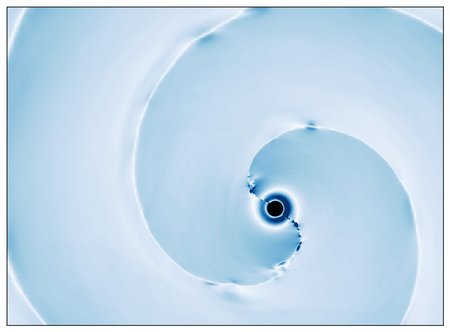With an out-of-this-world resume that includes the novels “Lost Moon: The Perilous Voyage of Apollo 13,” which was adapted into director Ron Howard’s 1995 film “Apollo 13,” and the 2017 film “Apollo 8,” Time magazine senior writer and best-selling author Jeffrey Kluger has naturally gravitated back into outer space with his latest thriller, “Holdout” (Dutton, 2021).
Recently released to stellar reviews, “Holdout” tells the riveting tale of Walli Beckwith, a model astronaut who makes a seemingly reckless decision to seek justice from the confines of the International Space Station as nefarious forces are going unchecked on Earth.
When Beckwith refuses to abandon her post at the space station in the aftermath of an accident that forces fellow astronauts to evacuate, her American and Russian colleagues are angered and confused. She’s locked in a race against time to save a region of the world that seems to have been forgotten, and also the life of the person she loves most. She’ll go to any extremes necessary, using the only tool she has, to accomplish what she believes is right.
Related: ‘Apollo 8’ author Jeffrey Kluger looks back at thrilling 1st moon mission

Holdout: A novel by Jeffrey Kluger: $21.99 at Amazon
An astronaut “holdout” refuses to abandon the International Space Station to save a forgotten part of Earth in Jeffrey Kluger’s epic new science fiction thriller. View Deal
Space.com spoke with Kluger about this latest space survival tale, his creative process and research regimen, and why he’s optimistic that his new sci-fi book comes as the world’s surging interest in all things rockets and space travel is receiving a serious injection of media attention.
Space.com: What was the evolution of “Holdout” and what were your storytelling goals?

Jeffrey Kluger: Well the genesis was simply the premise that a woman, who was a male astronaut at the time, refuses to come home from the International Space Station. I had no idea why or what the character’s motivation would be, but it would have to be a very good one otherwise the character’s actions would be considered eccentric and selfish and arrogant, not to mention criminal. All I had was that single premise initially.
I know that a lot of astronauts, when their rotation is up on the International Space Station, find it really hard to come home. I mentioned this book topic to astronaut Suni Williams one day when she was with former astronaut Mike Massimino, and Massimino said, “That sounds like you, Suni.” The idea that somebody would refuse to come home was very appealing to me. I went through many reasons for her to stay before finally alighting on the one I came down on, which was to save the indigenous people of the Amazon. I came up with it in early 2016 but didn’t start writing until November 2017 and it took a year to write, then I set it aside for a bit and finished it in early 2020.
Space.com: This is a fortuitous time for your book to drop into the market with renewed media coverage of space travel and space tourism and readers eager to engage in space stories. How do current events play into the timely release of “Holdout” and its attraction?
Kluger: Of course that’s all serendipity and I couldn’t have foreseen that at the time, but I do think there’s a bit of a sweet spot in the market for which I am very grateful. I do think the appeal of space is universal and pretty timeless. And to the extent that my space books have enjoyed success, and books like “The Martian” and “First Man,” and the movie “Gravity,” are indicative of the fact that space is something people are hungry for and drawn to no matter what. But it does ebb and flow, and there are times in history, say in the ’60s when people were hungrier for it, and then in the ’80s less so, and now we’re coming into another bright spot when people are drawn to stories about space, narrative fiction, and also to the real-world endeavors taking place.
We not only have Jeff Bezos and Richard Branson, but also the SpaceX Inspiration4 crew, the four non-professional astronauts who are training and flying in September aboard a SpaceX spacecraft, something we’re covering heavily in Time magazine. So I think in real life, space is hitting a high watermark and if that raises the boat of my book then that will very much please me.
Space.com: How was the research process different this time when compared to previous space-based projects?
Kluger: I was actually just thinking about that today. The science had to remain true to how real science works so I did a lot of deep research into the space station and various venues in which the book takes place. One of the things that was very fortunate was that when Time was doing our “Year in Space” documentary on Scott Kelly‘s year aloft in 2015-2016, we visited a lot of the places that I mention in the book. We visited the Gagarin Cosmonaut Training Center, Baikonur Cosmodrome in Kazakhstan, and saw a Soyuz rocket take off. I went to Moscow Mission Control, and we of course had been to Houston and Cape Canaveral.
So I was able to use a lot of what I learned from those places and incorporate them into the book. In some ways, even though this was fiction, the research was at least as deep as for “Apollo 13” and “Apollo 8.”
Space.com: What did you draw from in crafting the character of Walli Beckwith and what elements of her personality inspired you?
Kluger: I find her stubbornness and willingness to break rules for a principle really compelling. I did model her off of astronaut Wally Schirra and his near mutiny on the Apollo 7 mission. And his waggish sense of humor. Both of those together were compelling to me and I wanted Beckwith to have equal parts of wit and mischievousness, but at the same time that kind of high principle. And as she herself says late in the book, a certain measure of arrogance that she’s willing to bring to a situation in which she thinks a matter of principle is at stake.
… which is what Wally Schirra did on Apollo 7 when he felt the mission was overpacked with non-essential scientific experiments. Female astronauts must be assertive people and tremendously courageous people. But I wanted the defiance that she brings to be a woman’s defiance, not a man’s defiance. It seems like it would be more nuanced and complex, less about chest-pounding and more about standing up for high principles. And maybe there’s some gender stereotyping going on there and I apologize if there is. It also made for richer emotional relationships in the book. Women in my experience do seem to be, as a group, more open to their feelings and the feelings of others, and more emotionally accessible.
Space.com: Where did your love of science fiction and writing emerge from growing up?
Kluger: I’d have to say the two things that got me hooked most compellingly were Arthur C. Clarke’s “Childhood’s End” and the movie “2001: A Space Odyssey.” The two of them together brought me into the sci-fi world. I’ve always preferred more non-fiction to fiction when it comes to science. When I first heard of “Holdout” described as science fiction, I thought, “Wow, I guess it is.” It’s science and it’s fiction. But since it takes place in contemporary times with technology that very much exists, I thought it fell outside the sci-fi rubric, but of course it doesn’t. It’s easier to see something like “Interstellar” as sci-fi since it takes place so far in the future.
Space.com: Are there plans for a Hollywood film adaptation of “Holdout” and if so, will you be involved in the screenplay?
Kluger: I wish I could say the rights have been snapped up, but they haven’t been yet. I’m hoping when the book comes out they will be. I know there’s been some interest but nobody has grabbed it yet. In the event that it is, I would very much hope to be involved in assisting in whatever the screenplay adaptation would be. I think screenwriting is a free-standing art form and I wouldn’t mind writing a screenplay. I’ve written one before, a romantic comedy that went perfectly nowhere. but I’d certainly be willing and enthusiastic to be part of the production and serve as a consultant and write the odd scene here and there, which I did on “Apollo 13.” And I wouldn’t mind having a cameo in the movie also, like the newscaster I played in “Apollo 13!”
“Holdout” is available now at bookstores and online outlets.
Follow us on Twitter @Spacedotcom and on Facebook.


